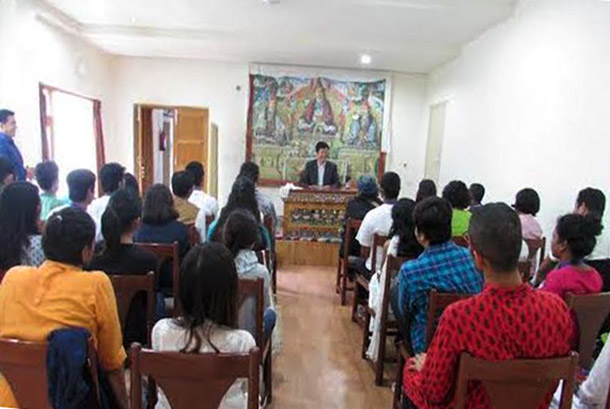 Dharamshala — Sikyong Dr Lobsang Sangay said that the "Middle Way Approach is a win-win proposition, which straddles the middle path between the status quo and independence."
Dharamshala — Sikyong Dr Lobsang Sangay said that the "Middle Way Approach is a win-win proposition, which straddles the middle path between the status quo and independence."
Dr Sangay's comments came as he spoke to a group of students regarding the Middle-Way Policy and the evolution of democracy of Tibet in exile. He explained that the Middle Way Approach which was formulated by His Holiness the Dalai Lama is the policy of the Central Tibetan Administration (CTA).
In continuation the Sikyong said that it is the only realistic solution to solve the issue of Tibet. He said, "The Middle Way Approach is a win-win proposition, which straddles the middle path between the status quo and independence - one that categorically rejects the present repressive and colonial policies of the Chinese government towards the Tibetan people while not seeking complete separation from the People's Republic of China."
The group of students came as part of the Gurukul programme which is held annually in Dharamshala. The programme induces cultural emersion by introducing the participants to Tibetan culture, religion, daily life of Tibetan people and the monasteries and nunneries.
While giving the students exposure to the political side, the Prime Minister also talked about the progression of democracy in Tibetan politics. "Tibetan democratic polity flourished under the guidance of His Holiness the Dalai Lama."
Sikyong said "Tibetan democracy in exile evolved over the years with major landmark decisions: establishment of Tibetan Parliament in 1960, the framing of the Constitution for future Tibet in 1963, the adoption of the Charter for Tibetans in exile in 1991 and the direct election of Kalon Tripa in 2001."
"Each of these accomplishments has prepared Tibetans for His Holiness the Dalai Lama's devolution of political authority to the democratically elected leadership in March 2011," said the democratically elected political leader of the Tibetan people.
The talk which lasted for around an hour ended with the Sikyong stating the Tibetan people's immense gratitude towards the Indian government and its residents for welcoming His Holiness the Dalai Lama and accepting the Tibetan refugees for the last sixty years.
Sikyong recently said that his administration is seeking the support of the Chinese people and the international community to encourage the Chinese government to resume dialogue in a spirit of reconciliation, and mindful of the many benefits to both sides that would stem from genuine autonomy.
The new Tibetan leadership also says the middle-way policy, seeks genuine autonomy for Tibet rather than complete independence. But till now, China has repeatedly rejected the approach and accused His Holiness the Dalai Lama of seeking to split the country.
The envoys of His Holiness the Dalai Lama and representatives of the Chinese leadership had nine rounds of talks from 2002 to 2010, since then there has been a deadlock between the two sides. Before 2002, there had been a nine-year gap without talks.
Acharya Yeshi Phuntsok, Deputy Speaker of the Tibetan Parliament-in-Exile (TPiE) also met with the students and gave a brief introduction of the TPiE.
This is the 22nd Gurukul program organized by the Foundation for Universal Responsibility of His Holiness the Dalai Lama. The foundation is aimed to benefit people everywhere, focusing specially on assisting nonviolent methods, on improving communications between science and religion and diversity of beliefs.


![Tibet has a rich history as a sovereign nation until the 1950s when it was invaded by China. [Photo: File]](/images/stories/Pics-2024/March/Tibet-Nation-1940s.jpg#joomlaImage://local-images/stories/Pics-2024/March/Tibet-Nation-1940s.jpg?width=1489&height=878)















